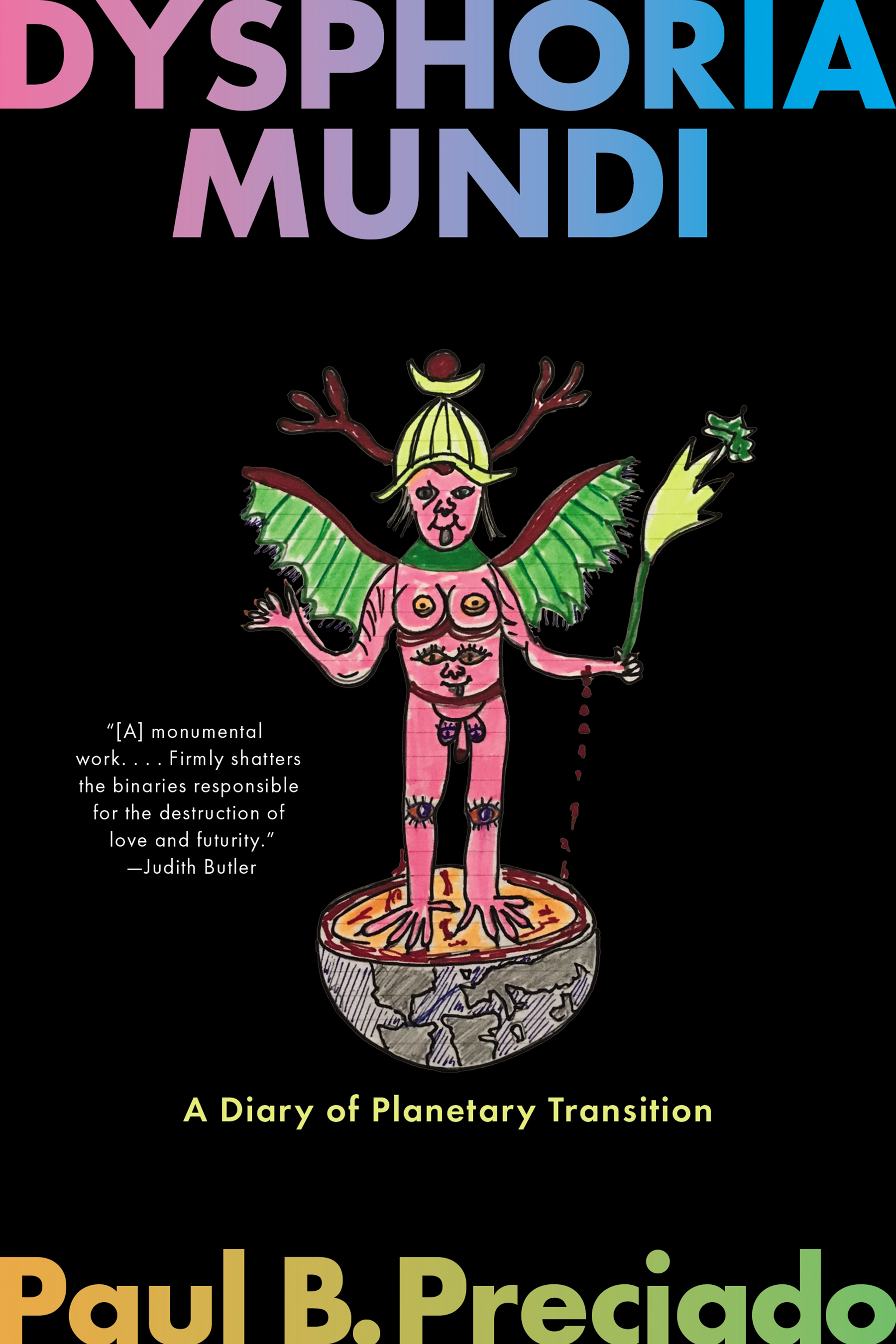
- Free Article: No
- Contents Category: Essay Collection
- Review Article: Yes
- Article Title: Philosophical zap
- Article Subtitle: A ‘non-binary book’
- Online Only: No
- Custom Highlight Text:
‘The time is out of joint,’ says Hamlet. And, as Jacques Derrida tells us in Specters of Marx (1993), it is also ‘deranged, both out of order and mad. Time is off its hinges … off course, beside itself, disadjusted.’ If time was deranged thirty years ago amid the AIDS crisis and the Balkan wars, in the wake of Francis Fukuyama’s ‘end of history’ and the first Gulf War, the times have now mutated, become radically other again and again. There is before Covid-19 and after, before generative artificial intelligence and after. There is time before the return of fascism as a global phenomenon and time after: time now as authoritarians surge to power on promises of a return to pasts not only unreachable (and, for many, undesirable) but which never existed in the ways they are now imagined.
- Book 1 Title: Dysphoria Mundi
- Book 1 Subtitle: A diary of planetary transition
- Book 1 Biblio: Graywolf Press, US$22 pb, 426 pp
- Book 1 Cover Small (400 x 600):

- Book 1 Cover (800 x 1200):

- Book 1 Readings Link: https://www.readings.com.au/product/9781644453322/dysphoria-mundi--paul-b-preciado--2025--9781644453322#rac:jokjjzr6ly9m
In Dysphoria Mundi, one of Derrida’s students, Spanish writer, filmmaker, curator, and autotheorist Paul B. Preciado, argues that ‘to say that time is out of joint is equivalent to saying that time is queer … Time is transitioning, is changing gender or sex. That time is trans.’ Nearly three years after its initial publication in Spanish and French, Preciado’s latest book arrives as a searching account of how it felt to live through the opening years of the Covid-19 pandemic and offers explanations for how an apparently disparate series of mostly human-made crises of the present exist in a state of relation to one another, even if they are not always directly connected. Arguing this way, Preciado sounds like an emissary from a future that is both already with us and that might still be possible: the future, in some places, is already here, in others the clocks have stopped or are running backwards.
A reader could arrive at Dysphoria Mundi without prior knowledge of Preciado’s work, although it helps to know the basic outline of his career, and in particular about the blazing Testo Junkie (2008) and the movingly diaristic An Apartment on Uranus (2019). The most accessible place to start, however, is his experimental film Orlando, My Political Biography (2023). A loose adaptation of Virginia Woolf’s novel, it is also a work of innovative autobiography, with several transgender people taking the role of Orlando and telling their own stories to camera. A furious, joyous film, it offers nuanced accounts of the spectrum of trans experience with sensitivity and humour. It also feels like a letter from another time, conveying a vision of a possible future.
Dysphoria Mundi is similarly complex in tone, both impassioned and playful. Preciado thinks about the relative porosity of boundaries, and the vehemence with which separations of kind and category are policed by those who believe themselves qualified (and convinced of the necessity) to do so. A ‘non-binary book’ that refuses to be only one thing, it instead moves freely across memoir, poetry, fiction, philosophy, libretto, epistle, and manifesto. In doing so, it takes up Derrida’s incantatory revival of Hamlet’s cry, here to offer a set of reflections on many aspects of today’s world that are out of joint and have produced the effects of global dysphoria that Preciado identifies.
Early in Dysphoria Mundi, Preciado describes the book’s project as ‘a philosophical zap: to displace and give new meanings to the medical notion of dysphoria in order to understand the contemporary global condition, the epistemological and political crack we are living through, and the tension between emancipatory forces and conservative resistances that characterize our present’. In Specters of Marx, Derrida identified ten ‘plagues of the “new world order”’ of the 1990s. Preciado here diagnoses ways in which he himself is out of joint, how the pharmaceutical and tech industries, but also how surveillance, the modern subject, fashion, truth, and a great many other things – both abstract and concrete – are in a state of contortion.
Dysphoria Mundi is most moving and persuasive when Preciado presents deeply personal and embodied acts of memoir to illustrate political contexts, constraints, and possibilities. These often spring from his experience of gender transition but are also textured by social class and states of expatriation. Preciado repeatedly orients himself against rigid identity politics and essentialism in favour of a critical and autobiographical mode that dwells in nuance, ambiguity, and embodied actions and activities. He asserts ‘that there are no natural, essential identities or subjects of revolution’; instead, he offers the concept of ‘political symbionts capable of acting together (or not)’. To act together would, it seems, provide the path to a better future.
As Derrida argued for the possibility of a ‘democracy to come’ in Specters of Marx, so Preciado keeps in view the utopian future he wants us to imagine. This requires resistance to the dispossessing dynamics of what he calls ‘a petrosexoracial regime of knowledge and power’ that is opposed to ‘a new regime … forged by acts of criticism and political disobedience’. Engaged throughout not only with Derrida, Michel Foucault, and Achille Mbembe, but also with Gilles Deleuze and Felix Guattari, Donna Haraway, and Judith Butler, Preciado has inherited the post-structuralist habit of generating neologisms to describe the overdetermination of certain states and socio-political phenomena. We have, for instance, the ‘somatheque’ or ‘the living body as a space for political action and philosophical thought’. Elsewhere there is the ‘pharmacopornographic’ and ‘necrobiopolitics’, the latter riffing on Foucault’s thinking about biopolitics and Mbembe’s ‘necropolitics’.
Readers hostile to post-structuralism and its legacies may find such terminological innovation and playfulness unbearable, but I encourage anyone sympathetic to the progressive (and, yes, revolutionary) spirit of this book to sit with their impatience and read to the end. Its patterning and strategies of formal repetition (lists of binary terms, a series of semi-satirical funeral prayers) work to recreate the feeling of these past several years, in which every day has often felt the same despite (or because of) its different atrocities, every atrocity seemed the same in its horror, and in our incapacity to comprehend the scale of the horror we have collectively unleashed on ourselves and others, and to which, it sometimes appears, we have become inured if not yet immune.
Given the lapse in time since the book’s composition and initial appearance in French and Spanish, the intensity of Preciado’s alarm might occasionally seem both belated and surpassed by the political ructions that have shaken Western democracies in the intervening years. Thus, while his trenchant account of the gender, military, and religious markers of Joe Biden’s 2021 inauguration (presented in the form of an aria libretto) might have felt bracingly astute three years ago, at the time of first publication, I would be eager to read Preciado’s analysis of America’s subsequent presidential election and inauguration and the unfolding aftermath of that further mutation in our sense of time’s derangement.
At the end of Dysphoria Mundi, I wanted to believe in the possibility of the better future Preciado imagines, but with each new pivot towards authoritarianism, each layer of civil society and discourse under attack, I find the darker future Preciado warns against more plausible, not least because of its already proven prescience: ‘The eye of power is … the necropolitical eye of the father: a binary, white, heterosexual, bourgeois and colonial father who can, through the gaze, decide not only on the life and death of his subjects, but also on the degree of political sovereignty that those under his gaze deserve.’ Nonetheless, Preciado reminds us, we must ‘leave room for utopia regardless of whether it ever arrives’. Some days, identifying the space utopia might one day occupy seems like the best we can hope for.


Comments powered by CComment